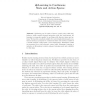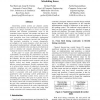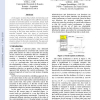112
click to vote
JSA
2010
15 years 15 days ago
2010
Effective slack management, i.e. management of unused computing resources, for real-time control tasks mandates to redistribute the available resources between controllers as a f...
ICRA
2010
IEEE
15 years 18 days ago
2010
IEEE
—Rehabilitation robots, together with vision and audio systems form the multimodal environment for exercising the person in a number of ways, unavoidably influencing the physiolo...
108
click to vote
AUSAI
1999
Springer
15 years 6 months ago
1999
Springer
Abstract. Q-learning can be used to learn a control policy that maximises a scalar reward through interaction with the environment. Qlearning is commonly applied to problems with d...
119
click to vote
RTSS
2002
IEEE
15 years 7 months ago
2002
IEEE
Closed-loop control systems are dynamic systems subject to perturbations. One of the main concerns of the control is to design controllers to correct or limit the deviation that t...
109
click to vote
IROS
2007
IEEE
15 years 8 months ago
2007
IEEE
— The principle of Series Elastic Actuation offers considerable advantages for haptic displays compared to stiff actuators. The interaction force between motor and load is direct...
106
click to vote
ETFA
2008
IEEE
15 years 8 months ago
2008
IEEE
1 In this paper, we study the problem of scheduling a set of control tasks. We distinguish three different situations of states of controlled plants: not activated, steady state si...



